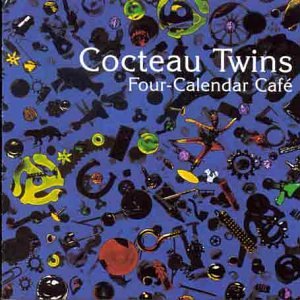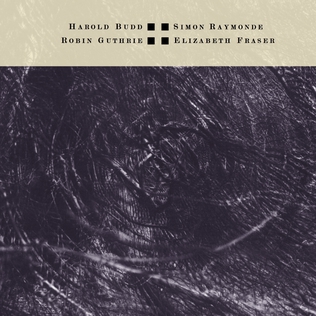Related Research Articles

Cocteau Twins were a Scottish rock band active from 1979 to 1997. They were formed in Grangemouth on the Firth of Forth by Robin Guthrie and Will Heggie (bass), adding Elizabeth Fraser (vocals) in 1981. In 1983, Heggie was replaced with multi-instrumentalist Simon Raymonde. The group earned critical praise for their ethereal, effects-laden sound and the soprano vocals of Fraser, whose lyrics often eschew any recognisable language. They pioneered the 1980s alternative subgenre of dream pop and helped define what would become shoegaze.

Head over Heels is the second studio album by Scottish alternative rock band Cocteau Twins. The album was released on 24 October 1983 through the label 4AD. It featured the band's signature sound of "Guthrie's lush guitars under Fraser's mostly wordless vocals" and is considered an archetype of early ethereal wave music.

Elizabeth Davidson Fraser is a Scottish singer. She was the vocalist for the band Cocteau Twins who achieved success in the UK primarily during the fifteen years from the mid-1980s to the late 1990s. Their studio albums Victorialand (1986) and Heaven or Las Vegas (1990) both reached the top ten of the UK Album Charts, as well as other albums including Blue Bell Knoll (1988), Four-Calendar Café (1993) and Milk & Kisses (1996) charting on the Billboard 200 album charts in the United States as well as the top 20 in the UK. She also performed as part of the 4AD group This Mortal Coil, including the successful 1983 single "Song to the Siren", and as a guest with Massive Attack on their 1998 hit single "Teardrop".
"She Moved Through the Fair" is a traditional Irish folk song, with a number of iterations, that has been performed and recorded by various artists. The narrator sees his lover move away from him through the fair, after telling him that since her family will approve, "it will not be long [love] 'til our wedding day". She returns as a ghost at night, and repeats the words again, intimating her own tragic death and the couple's potential reunion in the afterlife. There are numerous alternate versions, some sung about a male lover, with different lyrics, such as "Our Wedding Day" and "My Young Love Said to Me", among others.
Blanco y Negro Records, a subsidiary of WEA Records Ltd., was established in 1983 by Geoff Travis of Rough Trade Records and Mike Alway of él Records. Michel Duval of Les Disques du Crépuscule was also involved with the label.

"Sir Patrick Spens" is one of the most popular of the Child Ballads, and is of Scottish origin. It is a maritime ballad about a disaster at sea.

Four-Calendar Café is the seventh studio album by Scottish band Cocteau Twins, released on 18 October 1993 by Fontana Records. It was their first release since leaving their former record label 4AD. Two singles were released to promote the album, "Evangeline" and "Bluebeard". A performance to promote "Bluebeard" on The Tonight Show with Jay Leno marked their debut performance on American television.

The Moon and the Melodies is a collaborative studio album by Scottish dream pop band Cocteau Twins and American minimalist composer Harold Budd. It was released 10 November 1986 by 4AD. The name "Cocteau Twins" did not appear on the release, which instead credited the band's three members and Budd individually.
"Captain Wedderburn's Courtship" is an old Scottish ballad dating from 1785 or earlier. It is Child Ballad #46, Roud 36. It is known by a number of titles, including "Lord Roslin's Daughter" and "The Laird of Rosslyn's Daughter".
"Mrs. McGrath" is an Irish folk song set during the Peninsular War of the early 19th century. The song tells the story of a woman whose son enters the British Army and returns seven years later having lost his legs to a cannonball while fighting against Napoleon presumably at the Battle of Fuentes de Oñoro. The general theme of the song is one of opposition to war. Along with "Johnny I Hardly Knew Ye", it is one of the most graphic of all Irish folk songs that deal with sickness and injuries caused by warfare. Irish folk song collector Colm Ó Lochlainn described "Mrs. Grath" as "known to every true born citizen of Dublin". It was very popular among the Irish Volunteers in the years leading up to the 1916 Rising and has been recorded by many singers and folk groups.
"Dark as a Dungeon" is a song written by singer-songwriter Merle Travis. It is a lament about the danger and drudgery of being a coal miner in a shaft mine. It has become a rallying song among miners seeking improved working conditions.
"The Snows They Melt the Soonest" is an English folk song dating back at least as far as 1821. It was mentioned, along with the lyrics, in Blackwood's Magazine (Edinburgh) of that year.

"Donkey Riding" is a traditional work song or sea shanty originally sung in Canada, Scotland and the Northeastern United States. It has also become popular as a children's song. The earliest written record of the song dates to 1857. The tune and words are an adaptation of "Highland Laddie". It is generally, but not universally, agreed that the "donkey" of the song title is a reference to the steam donkey, a kind of general-purpose steam engine. Stan Hugill, a sea-music historian, said that he had been informed that the song was also sung in the Gulf Ports as well as being popular at sea.
"The Shoals of Herring" is a ballad, written by Ewan MacColl for the third of the original eight BBC Radio balladsSinging the Fishing, which was first broadcast on August 16, 1960. Ewan MacColl writes that the song was based on the life of Sam Larner, a fisherman and traditional singer from Winterton-on-Sea, Norfolk, England. Liam Clancy, who performed the song for decades, tells a more nuanced story, saying that MacColl "tape recorded all the old fisherman up along the east coast of England. And he never used one word of his own. ... He rhymed the lines that the fishermen had given him, and he made it into a song..."
Rev. John Broadwood was the first English folk song collector.
"The Last Of The Great Whales / The Last Leviathan" is an anti-whaling English folk song which has been recorded by Sheena Wellington, Archie Fisher & Garnet Rogers, Louis Killen, Danny Spooner, Maz O'Connor, Melanie Harrold, Fraser Bruce, and David Carroll.
"My True Love Is Lost" is an English folk song, which has been recorded by Etchingham Steam Band, Steeleye Span, and Olivia Chaney.
"Cold Blow and a Rainy Night" is an English folk song which has been recorded by numerous musicians and musical groups, including James Bowie, Jeannie Robertson, Steeleye Span, Martin Carthy, Planxty, and the Exiles.
"Roll Down to Rio", also known as "The Beginning of the Armadillos", is part of the Just So Songs poetry collection. It was set to music, which has been recorded by Peter Bellamy, Dave Webber and Anni Fentiman, The Young'uns, and Peter Dawson.
"A Pilgrim's Way" is one of the most popular of poems by Rudyard Kipling. It was set to music by Peter Bellamy, and has been recorded by Cockersdale, Finest Kind, John Roberts & Tony Barrand, Damien Barber & Mike Wilson, as well as the band Pilgrims’ Way.
References
- ↑ "All Bells in Paradise". Mainly Norfolk. Retrieved 8 February 2024.
- ↑ "For As Many As Will". Mainly Norfolk. Retrieved 8 February 2024.
- ↑ "The Young May Moon". Mainly Norfolk. Retrieved 8 February 2024.
- ↑ Lee, Sam (2019-12-05). ""Mercury-Prize Nominated Singer & Song Collector Sam Lee Releases New Single Feat. Cocteau Twins' Elizabeth Fraser The Moon Shines Bright'"". Cocteau Twins. Retrieved 9 February 2024.
- ↑ "The Moon Shines Bright". EFDSS . Retrieved 8 February 2024.
- ↑ "The Moon Shines Bright". Mudcat Café . Retrieved 8 February 2024.
- ↑ "The Moon Shines Bright". Mainly Norfolk. Retrieved 8 February 2024.
- ↑ "Song List". A Folk Song A Day . Retrieved 24 January 2024.
- ↑ "Song List". 365 Days Of Folk. Retrieved 24 January 2024.
- ↑ "The Moon Shines Bright". Hymnary.org. Retrieved 9 February 2024.